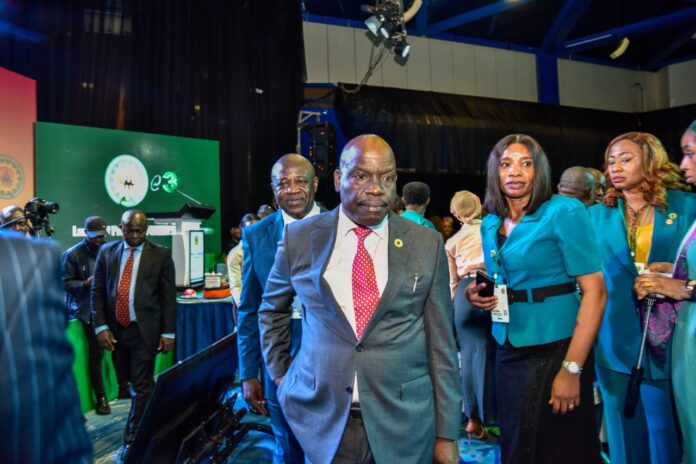….crossed 1.8 MMBOPD mark on peak production last month
The Nigerian Upstream Petroleum Regulatory Commission NUPRC, has said that it is pursuing the Project 1 MMBOPD Incremental initiative with modest gains recorded owing to the multi-stakeholder collaborative approach adopted.
The Commission Chief Executive Gbenga Komolafe stated this at the ongoing Society of Petroleum Engineers (SPE) Nigeria Annual International Conference and Exhibition (NAICE) in Lagos, Nigeria
“We are glad to report that we crossed the 1.8 MMBOPD mark on peak production last month, with average production hovering at 1.78 MMBOPD, “ he stated
“As part of our commitment towards sustainable production, the Commission is optimising the Maximum Efficient Rate (MER) framework, addressing produced water management, and aligning operational shutdowns and turnaround maintenance schedules to ensure minimal production disruptions. Given the above and with the concerted efforts of all, the presidential mandate on production increase is well within reach. “
He stated that On another breadth, the NUPRC is implementing the Upstream Oil & Gas Decarbonisation & Sustainability Blueprint anchored on seven (7) critical pillars to signal direction for the industry sustainability. “Our approach is to future-proof the upstream sector and position it for investment attractiveness, sustained funding, and global competitiveness.”
“We call on all Operators to collaborate with us as we incorporate decarbonisation measures in Field Development, Facility Engineering, and Production Operations to accrue the afore-mentioned benefits. “
“As we look ahead, let us acknowledge that building a sustainable energy future will demand trade-offs, innovation, and coordinated effort. The conversations that take place here at NAICE must be followed by action, by all of us.”
He staed that there is no gainsaying that the SPE is global community of engineers, scientists and related energy professionals who have contributed in no small measure to the body of knowledge and the advancement of the Oil & Gas industry, and growth of the national economy.
Times indeed have changed; however, the core values and focus of this illustrious association has remained intact. From the times of rudimentary tools, techniques and methods employed by geoscientists and engineers in the 1970s to the advanced suites of engineering modelling software powered by complex computer algorithms, machine learning and artificial intelligence today, our petroleum engineers have continued to add value. SPE has come of age as a contemporary industry association of global reckoning. I charge us all to continue to deliver real solutions for the profession and industry in the years to come.
He stated: “Indeed an honour to join you today at this year’s edition with the theme, Building a Sustainable Energy Future: Leveraging Technology, Supply Chain, Human Resources and Policy, captures the critical elements that must converge for the upstream sector to remain viable and aligned with global trends. At the Nigerian Upstream Petroleum Regulatory Commission (NUPRC), we see this theme not as a future aspiration but as a present mandate.”
“As the Upstream Industry regulator, our responsibility goes beyond compliance. We are focused on enabling a stable, efficient, and forward-looking upstream sector, one that balances the imperatives of energy security, environmental responsibility, and economic sustainability.”
“Technology is central to enabling a dynamic and vibrant industry. Today, we are witnessing a shift in exploration, development and production methods anchored on technological transformation. At the Commission, we are promoting technology adaptation and sanctioning novel technologies in all areas of E&P – from traditional operations to innovative approaches for decarbonisation and emission reduction. “
“By the same token, the NUPRC has embraced technology in its regulatory operations to enhance service delivery, improve turnaround time and rejig its business process. These are not just technical upgrades; they are part of our broader effort to entrench transparency, promote accountability and reduce costs – all geared towards enabling industry growth and vitality. “
“ Similarly, we recognise that a reliable and vibrant supply chain is critical for reducing lead times, lowering costs, and strengthening national capacity. We have taken deliberate steps to create a regulatory environment that supports the growth of service companies, both international and indigenous. Our approach to regulatory enablement is geared towards domestication of technology, promoting local manufacturing, and enhancing overall supply chain resilience.”
“Human capital remains the most valuable asset of our industry. The Commission continues to collaborate with institutions, professional bodies, and training providers to enhance skills development, promote technical excellence, and ensure that our workforce is prepared for the challenges of a low-carbon future. We therefore charge SPE and other industry associations to accept the challenge of manpower and contribute to repositioning the industry through targeted capacity-building and our engagement with young professionals, in consideration of the fast-evolving global energy landscape.”



